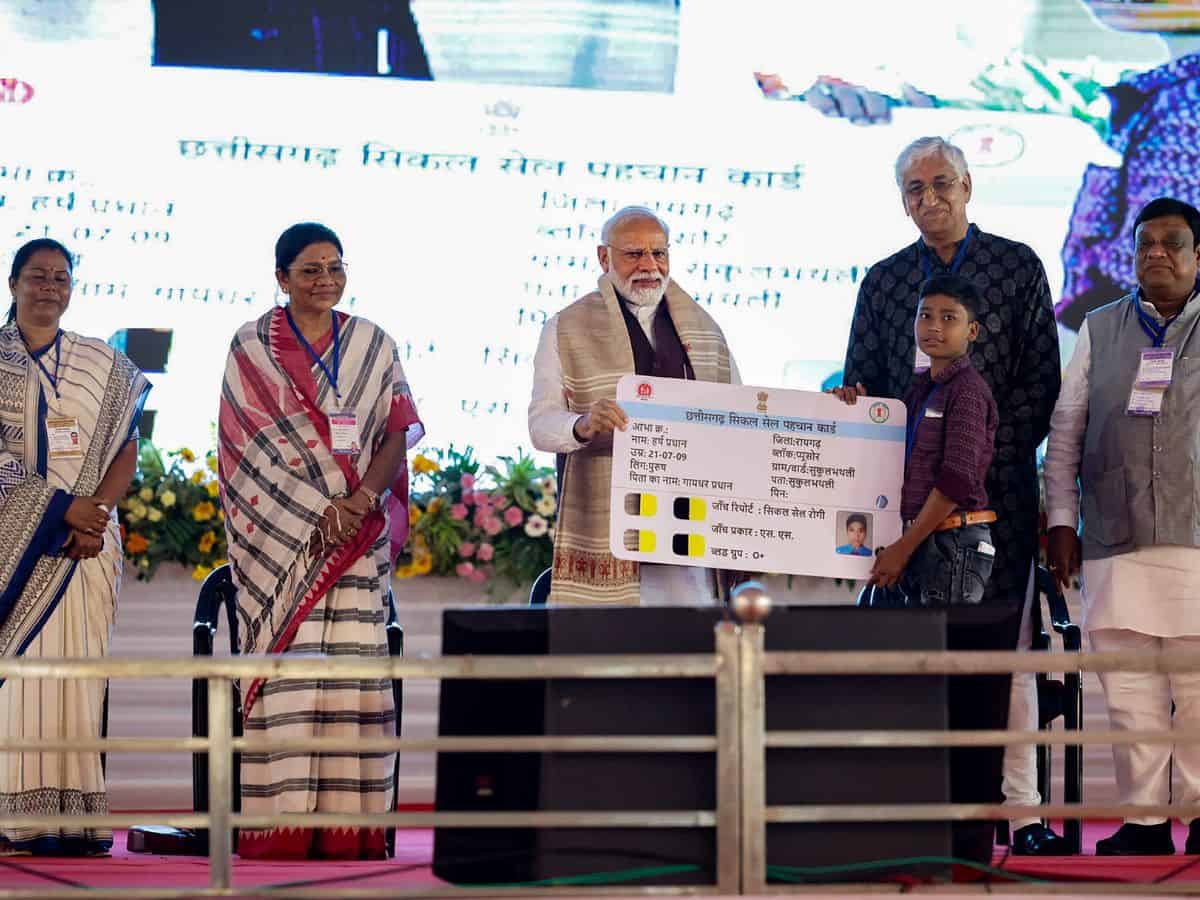
Raigarh: Prime Minister Narendra Modi on Thursday said global organizations are talking about learning from India’s success stories in different fields and this was possible because every region in the country was getting equal priority in development and welfare of the poor under his government.
Addressing a function at Kodatarai village in Raigarh district, he described Chhattisgarh as a powerhouse for development of the country.
On the occasion, the PM inaugurated important rail projects worth around Rs 6,350 crore and laid the foundation stone of 50-bed each ‘critical care blocks’ in nine districts of Chhattisgarh, where assembly polls are due by the year-end.
He also distributed 1 lakh sickle cell counselling cards to the screened population.
“The entire world is not only watching but also heaping praise on the Indian model of ‘Garib Kalyan’ (welfare of poor). Heads of big countries had come to New Delhi to attend the G20 summit and all of them were impressed by India’s efforts towards development and Garib Kalyan,” he said.
“We have seen that in just five years, 13.5 crore people have come out of poverty. This happened because the BJP government launched welfare schemes in the interest of the poor,” he added.
Today, global organizations are talking about learning from India’s success and this was happening because every state and every area of the country is getting equal priority in development, Modi said.
The PM said in the last nine years, the central government has continuously worked for all-round development of Chhattisgarh, currently ruled by the Congress, and results of that vision and policies are visible today.
“Today, a new chapter is being written in development of Chhattisgarh’s railway network”, he said, adding improvement in train network post completion of projects will reduce congestion in the Jharsuguda-Bilaspur section of the Bilaspur-Mumbai line.
Similarly, Railway lines that are being started and train corridors that are being constructed will give further fillip to industrial development of Chhattisgarh, said the PM.
“Upon completion, these routes will not only provide convenience to the people of Chhattisgarh but will also create new employment and income opportunities in the region,” he said.
The PM said in the next 25 years of ‘Amrit Kaal’ (period culminating in centenary of independence in 2047), “we have to transform India into a developed country” and stressed on equal participation of every citizen in this development journey.”
“We have to meet the energy needs of the country and also take care of the environment,” he emphasized.
Speaking on the occasion, Chhattisgarh Deputy Chief Minister T S Singh Deo said the Centre has not been biased towards states.
“In my experience, I haven’t felt biases. If we, as state governments, have worked and sought anything from the Centre, it has cooperated. I believe we will take this state and country forward together with mutual cooperation,” Singh Deo said.
After concluding his speech, Singh Deo, a senior Congress leader, was seen shaking hands with the PM on the dais.
The projects which were inaugurated included Chhattisgarh East Rail Project Phase-I, third rail line between Champa to Jamga, third rail line between Pendra Road to Anuppur and MGR (Merry-Go-Round) system connecting Talaipalli Coal Mine to NTPC Lara Super Thermal Power Station (STPS).
The Chhattisgarh East Rail Project Phase-I is being developed under the ambitious PM Gati Shakti-National Master Plan for multi-modal connectivity and consists of a 124.8 km rail line from Kharsia to Dharamjaigarh, including a spur line to Gare-Pelma and three-feeder lines connecting Chhal, Baroud, Durgapur and other coal mines.
The 50-bed each ‘critical care blocks’ will be built in nine districts of Chhattisgarh. The nine critical care blocks will be built under the Pradhan Mantri-Ayushman Bharat Health Infrastructure Mission (PM-ABHIM) at Durg, Kondagaon, Rajnandgaon, Gariaband, Jashpur, Surajpur, Surguja, Bastar and Raigarh districts at a cost of more than Rs 210 crore.
With an aim to address health problems caused by sickle cell disease, especially among the tribal population, counselling cards were distributed to the screened population under a national programme.
The PM distributed 1 lakh counselling cards to the screened population under the National Sickle Cell Anaemia Elimination Mission (NSAEM).



